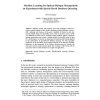Free Online Productivity Tools
i2Speak
i2Symbol
i2OCR
iTex2Img
iWeb2Print
iWeb2Shot
i2Type
iPdf2Split
iPdf2Merge
i2Bopomofo
i2Arabic
i2Style
i2Image
i2PDF
iLatex2Rtf
Sci2ools
AIMSA
2006
Springer
2006
Springer
Machine Learning for Spoken Dialogue Management: An Experiment with Speech-Based Database Querying
Although speech and language processing techniques achieved a relative maturity during the last decade, designing a spoken dialogue system is still a tailoring task because of the great variability of factors to take into account. Rapid design and reusability across tasks of previous work is made very difficult. For these reasons, machine learning methods applied to dialogue strategy optimization has become a leading subject of researches since the mid 90's. In this paper, we describe an experiment of reinforcement learning applied to the optimization of speech-based database querying. We will especially emphasize on the sensibility of the method relatively to the dialogue modeling parameters in the framework of the Markov decision processes, namely the state space and the reinforcement signal. The evolution of the design will be exposed as well as results obtained on a simple real application.
Related Content
| Added | 20 Aug 2010 |
| Updated | 20 Aug 2010 |
| Type | Conference |
| Year | 2006 |
| Where | AIMSA |
| Authors | Olivier Pietquin |
Comments (0)

